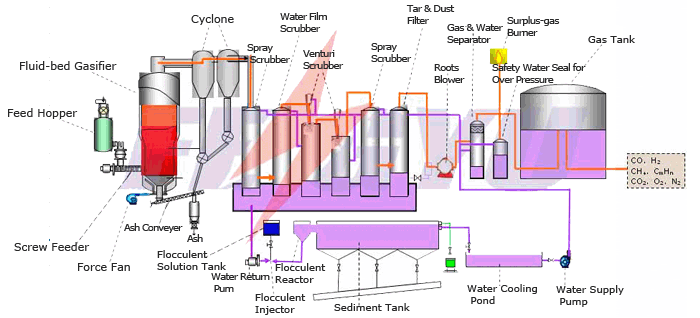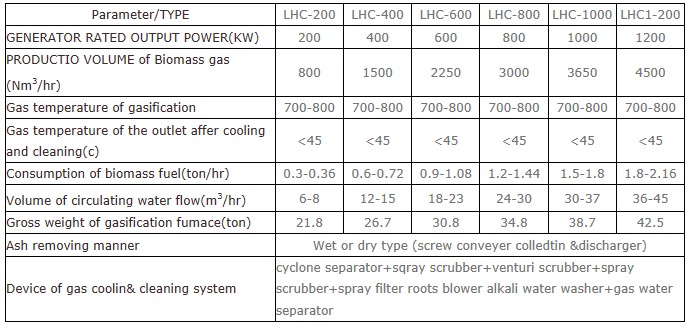1.Biomass gasification principle
Biomass gasification means incomplete combustion of biomass resulting in production of combustible gases, including Carbon monoxide (CO), Hydrogen (H2), Methane (CH4), CmHn, this mixture is called pyrolysis gas that can be used to run internal combustion engines, and generate CHP. The production of pyrolysis gas called gasification, is partial combustion of biomass (such as rice husk, woodchips, saw dust, crop stalk, coconut hull, bagasse, olive pomace etc.). The reactor is called gasifier.

C + O2 = CO2
2H2 + O2 = 2H2O
C + CO2= 2CO
C + H2O = CO + H2
CO + H2O = CO + H2
C + 2H2 = CH4
CO2 + H2 = CO + H2O
Water for gas cleaning and cooling can be used in a circulating way without environmental pollution after it’s treated througffh water treatment facilities such as sediment pond, and a little of making-up water required. The water pond for each unit of 200kw plant only covers about 50m2.
2.Biomass Gasification for Power generation
Power generation by using biomass gas from rice husk, wood chips, saw dust, coconut husk, bagasse, crop stalks and olive pomace can not only save electricity expenses in the production cost for rice mills, timber processing mills, farm and plantations etc., but also get benefits from selling surplus electric power to the power grid.
The engines and generator, electrical equipments should be put indoors, and other equipments could be put outdoors. The construction area for each 200kw generator set is approximate 40~50m2.
The self-consumption power rate of full set of equipment is only 5~8% of the generated power. Therefore, such a project is an ideal one with significant benefits for the area where there is plenty of biomass resources but is short of electric power supply or with higher electricity expense.
In general, the investment for major equipment can be taken back from power generation benefits within first two years. The equipment can be safe and reliable operated with operational technology that's easy to be mastered by workers, and the maintenance and repair work is similar to ordinary diesel generators.
3.FENGYU Fluid-bed Gasifier
FENGYU’s fluid-bed biomass gasifier (patented product of Fengyu Group) gets high conversion efficiency, by taking rice husk as an example, each KWH power generation consumes only 1.6~1.8kg rice husk, the unit fuel consumption will be still lower by using wood chips or crop stalks as fuel. When operation temperature is 800, the tar production ratio in fluid bed gasification furnace is about 2.5%. Tar content after decoking treatment is less than 50mg/Nm3, through strict cleaning and thermal cracking, the dust & tar content of biomass gas are very tiny, which can meet the requirement for the internal-combustion engine and steam turbine normal operation.

|
Note: Main components and caloricity of biomass gas are subject to characteristic of biomass fuel and gasification method. The caloricity of biomass gasification gas is normally 1100-1500kcal/Nm3. (4.6~6.3MJ/Nm3) For example, main component of rice husk gasified gas are as follows: |
||||||||||||||||||
|
||||||||||||||||||
| (The caloricity is:1393kcal/Nm3 (5.83 MJ/Nm3) |